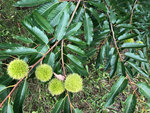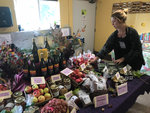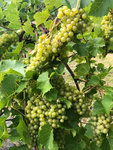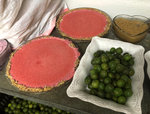




Up on Burnt Ridge, overlooking the lazy, snaking Cowlitz River Valley with a view of Mount St. Helens slumbering just 30 miles away, orchardist Michael Dolan has spent the past four decades cultivating an enchanted, indiginous organic fruits and nuts outpost.
A self-described city boy, in his 20s Dolan was inspired to leave the concrete jungle after reading the book “Tree Crops: A Permanent Agriculture,” by J. Russell Smith (1874-1966), first published in 1929. It is described as “a classic, pioneering look at the use of trees for food, soil conservation, and sustainable agriculture.”
Dolan now had a mission. He had just graduated from the Evergreen State College in Olympia. He didn’t own a car, but he did have a bike. He pedaled his way across the Pacific Northwest, looking for a place to start his orchard.
He discovered Burnt Ridge. He bought the land, which was full of stumps and blackberry bushes. He pushed through a trail and set up a camp about 100 yards in from Burnt Ridge Road. He learned to clear the property with help from neighbors, including the use of dynamite to blow up large stumps (today they use stump grinders). He worked the land and built a home.
Indiginous, Non-Indiginous
Indiginous means native to an area. Dolan has planted thousands of fruit and nut trees native to the distinct environment above the Cowlitz Valley and across much of the Pacific Northwest west of the Cascades. He has crawled through homesteads searching for centuries-old native trees, in search of sustainable native plants. He focuses on plants that are naturally disease and pest resistant. He was organic before the term went mainstream.
He plants trees, then scientifically observes if they have found a home. Some do, some don’t. For those that don’t thrive in this climate, Dolan tears out the roots and starts over with a new variety.
But Dolan is up to so much more than native trees.
He has searched the world far and wide, traveling to areas comparable to those found on his 20 acres on the ridge sitting at an elevation of 1,000 feet, with southern exposure. He believes the ridge above the Cowlitz is perhaps the coolest climate in the lower 48 states. It also gets twice the rain as Seattle as it sits in the foothills of the Cascades.
“It’s been a 40-year ongoing experiment of what we can grow here,” Dolan said. “I’ve taken out thousands of trees that don’t work here.”
He’s Lewis County’s version of Johnny Appleseed, the American folklore pioneer nurseryman who spread apple trees starting in the late 1790s to Pennsylvania, Ontario, Ohio, Indiana and Illinois. Appleseed preached the healthy and cultural value of apples. Appleseed didn’t plant apple trees, he started nurseries that were then widely planted and fed the pioneers and farmers once established.
Dolan has his one nursery, but publishes a 70,000-copy brochure to eager organic fanatics across the United States. They buy produce. They also buy his trees.
Dolan brings in non-indeginous plants, ones he believes have a chance of thriving far away from their ancestral lands and on the ridge. A kiwi native to Siberia is one of his favorites.. The small kiwi are not fuzzy on the outside, but smooth like a plum, the color of lime green, the diameter of a mid-sized cherry tomato. Pop one into your mouth and a refreshing juicy sweetness hits the taste buds. That’s when you realize this is not your normal orchard.
Dolan is interested in what will grow in our area, as well as encouraging people with small to large tracts of land to use his decades of work and knowledge to plant their fields and forests, creating sustainable trees that will last and provide long after he is gone from the land.
“I love providing food and turning people onto stuff they can grow around here,” he said.
Taking the Tour
This past Saturday, Dolan led two tours of 30 people each through his grounds, giving a walking tour filled with the history of his trees, of chestnuts and hazelnuts and grapes. He talks of the 70 varieties of apples on his orchard, while his rescue dog Ginger lazily lopes along with the eager people thrilled to soak up the strange, peaceful experiment Dolan has created. He explains grafting a chestnut from one belonging to a long-ago mayor of Centralia who had the looming tree planted right at the corner of his downtown home.
The graft has now grown to a towering chestnut. Dolan is gratified that he spliced the graft before new owners years ago cut the Centralia chestnut tree down. Its branches and leaves and nuts were just too messy, although the tree averaged 800 pounds a season of chestnuts, which are chock full of nutrition and taste..
The tour starts in a chestnut and hazelnut grove, and wound up into his apples and pears. He walks past mulberry trees draped in netting, past greenhouses filled with nut tree starts, down into his grape vines that thrive in the chill environs above the Cowlitz River, distinct from the popular grapes growing in the irrigated heat of Eastern Washington. He shows off a Monkey Puzzle Nut from one of his trees, named because it was puzzling that monkeys could climb the tree with its needles pointing out ready to prick. Definitely not native.
Kei Ellerbrock, who moved from the east coast to work at the nursery as an office assistant and in marketing, organized a display for the tour of all that is grown at the orchard, along with its fruit wines made on site and jams and jellies.
She is one of 10 year-round employees. During the summer and fall, they focus on the trees and what they produce. In the winter and spring, they ship trees across the United States.
The property also has a commercial kitchen and a winery. On Saturday a cooler just off the kitchen had a bowl of the sweet kiwis next to a hazelnut crust and fresh strawberry and yogurt pie Dolan made the evening before.
“It’s such a home-grown nursery and they manage to do so much variety,” Ellerbrock said. “They really push the limit on what we can grow here. Michael really likes to experiment with the nursery and grow everything we can manage.”
Dolan said a lot of the people on the tour on Saturday have been customers for generations.
Shane Peterson and his father Carl Petersen were up from Oregon for the tour. They looked forward to strolling through the orchard.
“There’s so much knowledge to be gained from this,” Shane Peterson said. “My wife and I visited a month ago, walked the property with Michael. He knows every single plant. He knows how to make everything beautiful.”
Ed and Cynthia Wallace of Winlock brought their two young grandchildren on the tour. He said they’ve been talking about coming out to the orchard for years, hearing about it from word of mouth.
“I came out here, I’m interested in planting indigenous trees and shrubs,” he said. “And the icing on the cake is when they can be berries and nuts.”